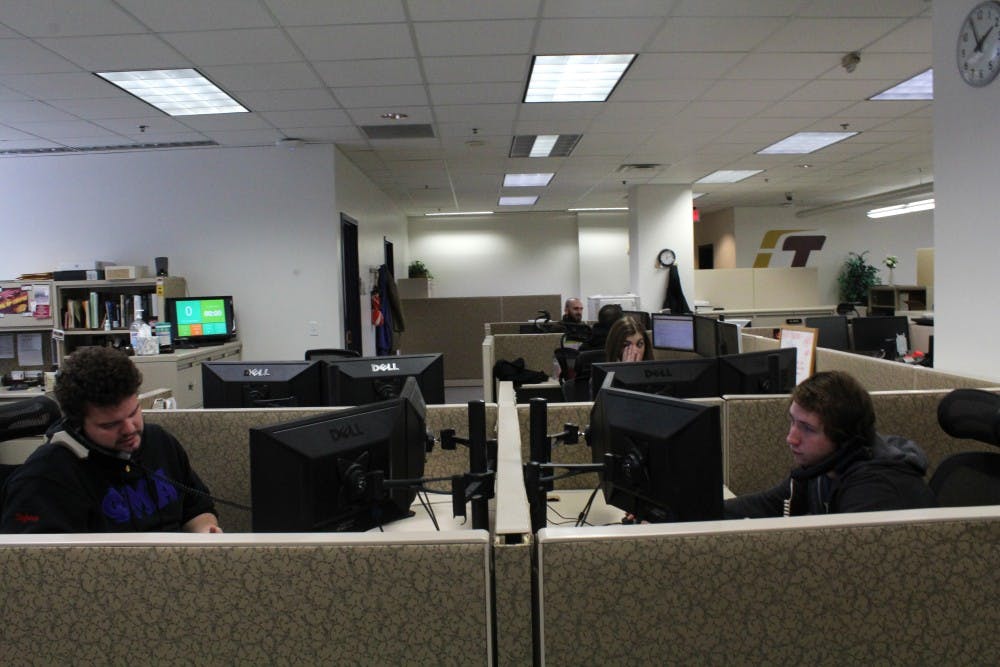On-campus piracy complaints more than quadruple since 2013

Nick Galanos was working in a mattress factory last summer when he received an unexpected call from Central Michigan University.
The university sent the Illinois sophomore a notice in April that he was being fined by the school after it received a copyright infringement notice. The notice said his computer was used to illegally download two movies: “Blades of Glory" and “The Town."
Galanos called the university back when he got off work. Initially, he lied and said his roommate used the computer to download the movies. The caller explained that if Galanos felt the accusations were false, he could make his case to a hearing officer.
“I decided it wasn’t worth it,” he said.
Galanos gave the university permission to charge a $100 fee to his student account.
The number of complaints received by CMU in response to illegal downloading and sharing of digital content over its network more than quadrupled in a single year, from 314 in 2013 to 1,388 in 2014, according to data provided by Roger Rehm, vice president for information technology and chief information officer. Data shows the number of complaints peaked at 73 in 2013, while in 2014 the peak was 534 complaints received in October, 70 percent more than was received in all of 2013.
In 2015, the number of complaints continues to grow. As of the end of October, there have been a total of 1,912 complaints this year. Official numbers for November will not be released until sometime in December.
Rehm said the network at CMU is not monitored by the university itself. Most owners of intellectual properties, such as movie studios or record companies, hire a separate companies to monitor networks for illegal downloading. Trade organizations such as the Recording Industry Association of America and Entertainment Software Association also may file infringement notices if they detect piracy of content owned by their members.
Rehm said there has been a focus on college campuses due to the number of people present.
“The fact of the matter is (monitoring companies) have targeted university campuses,” he said. "There is no question that they treat us differently than other networking organizations.”
The complaints provide an IP address, which the university uses to identify the person who downloaded the content. The identity of the owner is kept private.
“We’re in the business of passing the complaint along,” Rehm said. “We do not identify them to the company.”
Data provided by Mark Strandskov, associate director of the Office of Information Technology, indicated the majority of complaints in 2014 and 2015 were sent by Rightscorp Inc., a copyright enforcement company based in Los Angeles that represents BMG Rights Management and Warner Bros.
Founded in 2011, the company had not sent a single copyright infringement notice to CMU until 2014. That year Rightscorp sent 899 complaints, about 65 percent of all the complaints received. In 2015 they issued 1,648 complaints.
"You have agencies like Rightscorp where in the last two years account for over 2,500 complaints,” Strandskov said. "They account for 81 percent of our total number of complaints this year and we didn’t receive anything at all from them two years ago. That sort of sticks out.”
Strandskov also said he had seen an increase in complaints from IP-Echelon and MarkMonitor.
In a letter provided by Strandskov sent to OIT by Rightscorp, the company offered to settle a case with a student who downloaded a copy of The Lord of the Rings: Return of the King if they paid a $30 fine and seized copying or distributing content owned by Warner Bros.
“The damage to WB from your conduct substantially exceeds $30, but in the interest of having you stop your infringement of WB content permanently, WB is prepared to make you this settlement offer,” the complaint reads.
When the university receives an infringement notice regarding pirated material, Strandskov said the office forwards the complaint to the student with an email stating the university’s stance on piracy.
“The use of copyrighted material without the copyright owner's permission is illegal infringement, for which you may be sued for monetary damages,” the email reads. “The owners of copyrighted films, music, software and similar materials are aggressively pursuing infringers. We strongly urge you to avoid any such illegal acts.”
The email goes on to inform students that if the copyright owners choose to sue students, they will not receive legal support from the university.
If OIT receives a second notice of infringement regarding the same IP address within two days of the first complaint, the office delivers the complaint to the student and the Office of Student Conduct is informed. Typically, a student receiving a second infringement notice is fined $150 by the university. The student also may be blocked from accessing the internet on their personal computer.
If a third infringement notice is received, the fine increases to $300. The student can also face dismissal from CMU. Strandskov said he did not know if a student has been expelled for piracy.
Tom Idema, director of the Office of Student Conduct, said if a student believes the complaint is false, they can take it to a university hearing to plead their case. If a student’s computer was used by another for piracy, as Galanos claimed his had been, the owner is still liable.
“When students register their computer to be used on the CMU network they accept responsibility for their computer no matter who may be using it,” Idema said. “If a roommate uses the computer to violate policy, the owner of the computer is still responsible.”
Galanos said he could understand the frustration companies feel when students illegally download movies and games.
“I guess it’s not fair that we download for free what they spend money to work on,” he said. "It’s knowing you can get something for free as opposed to going out and paying for it."



